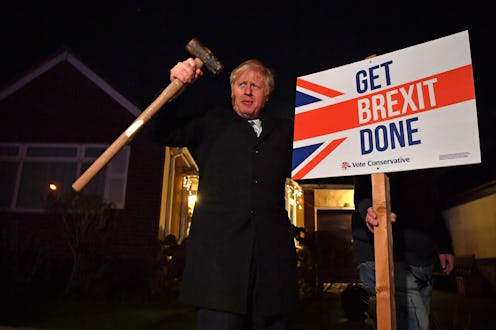News
Brexit Is Happening On Friday, So Here's What That Means For You

More than three years have passed since the historic referendum in which 52% of voters opted to leave the European Union (EU). Despite a persisting divide in the nation, Brexit is happening. After Theresa May's resignation and countless debates, MPs finally agreed on Prime Minister Boris Johnson's deal, marking Brexit as 11 p.m. on Jan. 31, 2020. But what actually happens on Brexit day? More importantly, how will people's everyday lives be impacted?
On Wednesday (Jan. 29), the final Brexit sign-off will take place. Members of the European Parliament (MEPs) will vote on the withdrawal agreement. But don't expect a sudden reversal, per the Guardian. The vote is almost symbolic in that all MEPs are expected to approve the Brexit terms. And that's not the only thing that's symbolic.
What Is Happening On Jan. 31?
The UK will formally leave the EU on Friday, Jan. 31. That means the UK will no longer be a member of the European Parliament or European Commission, and so it will no longer have a say in EU matters. However, the UK can't just do what it wants. Per the BBC, the European Court of Justice will still preside over legal issues and the UK will still financially contribute to the EU. (That will only last until the end of the transition period, but more on that later.)
Unsurprisingly, there won't be much fanfare. Downing Street will project a clock counting down until the last hour, reports the Evening Standard. Boris Johnson will also address the nation on Friday evening.
So How Will I Be Affected After That Date?
In all honesty, you won't notice much at first. As part of the withdrawal agreement, a transition period will last from Jan. 31 until Dec. 31, 2020. This will allow both the UK and EU to embark on further negotiations and come to a full agreement about their future relationship, per the BBC.
But during the transition period, everything will remain the same. You will still be able to freely travel to and from the EU, and live and work in EU countries. The trading agreement will also remain until the end of 2020, meaning the prices of goods and services are unlikely to change.
Hasn't The Negotiating Finished?
Not quite. The UK still has to figure out a trade deal with the EU. Arguably the most complicated element of Brexit, this will establish whether taxes will be placed on goods travelling to and from the UK and whether items will need to be checked at borders.
As the Guardian revealed, these negotiations will not begin until March 3, leaving many wondering whether the transition period will be extended. This is possible, thanks to the terms of the withdrawal agreement. In it, a clause states the transition period can be extended by 12 or 24 months. However, any extension would need to be agreed by July 1, 2020, reports the BBC. Johnson has said he is not willing to extend, per the Independent.
Trade isn't the only factor requiring further discussion. As the BBC reports, the likes of plane safety, medicine regulation, and law enforcement cooperation will also be on the negotiating table.
So What Will Change After The Transition Period?
Come 2021, life in the UK could be very different. There will be no more free movement between the UK and EU, although eligible citizens living in different countries can apply for settled status. (There has been controversy over the Home Office rejecting valid applications, iNews reports.)
If you want to travel to the EU after the transition period, you will have to apply for a European Travel Information and Authorisation System (ETIAS) visa waiver. Per the Telegraph, this should cost around £6 and will last a number of years. European Health Insurance Cards (EHICs) may be valid after Brexit or a similar scheme may be introduced, notes the paper.
Workplace and equality rights are still up in the air, as Stylist reports. Currently implemented by the EU, they aren't mentioned in the Brexit deal. The future of EU-funded projects is also unclear.
Post-transition, the UK will have officially left the single market and customs union, potentially affecting the cost of goods. Northern Ireland, in particular, could be heavily affected by new trade agreements.
Johnson's Brexit deal removed the controversial backstop which would have prevented a hard border between Northern Ireland and the Republic of Ireland. In a bid to stop the entire UK being stuck in a close trading deal with the EU, Johnson proposed customs checks between Northern Ireland and Britain. Per the BBC, some goods entering Northern Ireland will have to pay import taxes that will be refunded if items don't cross over into the Republic.
Can Brexit Be Cancelled?
The withdrawal agreement is a "legally binding international treaty," notes the Guardian. So after Jan. 31, overturning Brexit won't be as simple as saying: "We don't want it anymore." Instead, the UK would have to apply to rejoin the EU; a process that could take time and would rely on the approval of the other 27 member states.
Whether you voted Leave or Remain, Brexit is a go. What that means for the average person, however, is still in part a mystery.